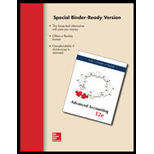
Advanced Accounting (Looseleaf)
12th Edition
ISBN: 9780077632595
Author: Hoyle
Publisher: MCG
expand_more
expand_more
format_list_bulleted
Textbook Question
Chapter 11, Problem 3P
Which of the following is not a reason for establishing international accounting standards?
- a. Some countries do not have the resources to develop accounting standards on their own.
- b. Comparability of financial reporting is needed between companies operating in different areas of the world.
- c. It would simplify the preparation of consolidated financial statements by multinational corporations.
- d. Demand in the United States is heavy for an alternative to U.S. generally accepted accounting principles.
Expert Solution & Answer
Want to see the full answer?
Check out a sample textbook solution
Students have asked these similar questions
None
Please provide the accurate answer to this general accounting problem using appropriate methods.
Please help me solve this general accounting problem with the correct financial process.
Chapter 11 Solutions
Advanced Accounting (Looseleaf)
Ch. 11 - Historically, what factors contributed to the...Ch. 11 - Nestl S.A. is a very large company headquartered...Ch. 11 - Prob. 3QCh. 11 - Prob. 4QCh. 11 - Prob. 5QCh. 11 - Prob. 6QCh. 11 - Prob. 7QCh. 11 - What are three countries that do not allow...Ch. 11 - Prob. 9QCh. 11 - Prob. 10Q
Ch. 11 - Prob. 11QCh. 11 - Prob. 12QCh. 11 - What are the two extreme approaches that a company...Ch. 11 - Prob. 14QCh. 11 - Prob. 15QCh. 11 - Even if all companies in the world were to use...Ch. 11 - Prob. 1PCh. 11 - Prob. 2PCh. 11 - Which of the following is not a reason for...Ch. 11 - Prob. 4PCh. 11 - Prob. 5PCh. 11 - Prob. 6PCh. 11 - Prob. 7PCh. 11 - Prob. 8PCh. 11 - Prob. 9PCh. 11 - Prob. 10PCh. 11 - Prob. 11PCh. 11 - Prob. 12PCh. 11 - Prob. 13PCh. 11 - Prob. 14PCh. 11 - Prob. 15PCh. 11 - Prob. 16PCh. 11 - Prob. 17PCh. 11 - Prob. 18PCh. 11 - Prob. 19P
Knowledge Booster
Learn more about
Need a deep-dive on the concept behind this application? Look no further. Learn more about this topic, accounting and related others by exploring similar questions and additional content below.Similar questions
- Please provide the accurate answer to this general accounting problem using valid techniques.arrow_forwardI am looking for the correct answer to this general accounting problem using valid accounting standards.arrow_forwardI am trying to find the accurate solution to this general accounting problem with the correct explanation.arrow_forward
arrow_back_ios
SEE MORE QUESTIONS
arrow_forward_ios
Recommended textbooks for you
 Cornerstones of Financial AccountingAccountingISBN:9781337690881Author:Jay Rich, Jeff JonesPublisher:Cengage Learning
Cornerstones of Financial AccountingAccountingISBN:9781337690881Author:Jay Rich, Jeff JonesPublisher:Cengage Learning

Cornerstones of Financial Accounting
Accounting
ISBN:9781337690881
Author:Jay Rich, Jeff Jones
Publisher:Cengage Learning
Business Diversification; Author: GreggU;https://www.youtube.com/watch?v=50-d__Pn_Ac;License: Standard Youtube License